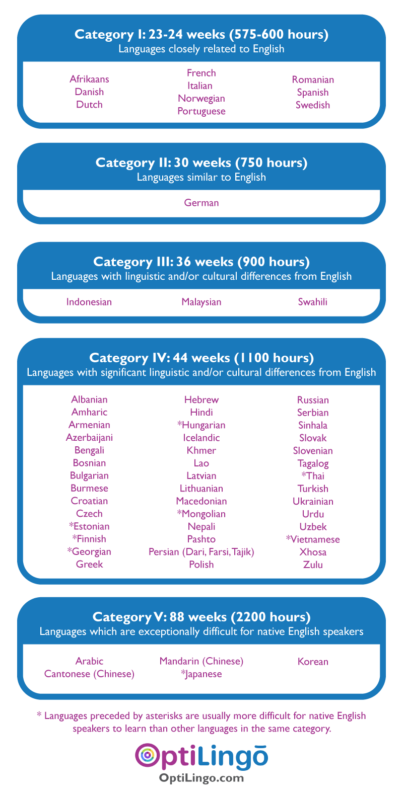The Benefits of Flexible Language Learning Programs
If you’re just starting to learn a new language, you may wonder how long it’s going to take you. And a quick search of the internet might surprise you. The thought of spending years to reach fluency in a foreign language might even keep you from starting. But, there’s a lot of conflicting answers out there. So, what’s the truth? How long does it really take to learn a language? The answer might surprise you.
How Much Time Do You Need to Reach Fluency?
Right off the bat, we need to address the Foreign Service Institute projections for language learning. Most likely, you’ve found sources quoting the time it takes to reach fluency in a foreign language between 24 weeks and 88 weeks. Usually, it comes in a chart like this:
Source: FSI (Foreign Services Institute)
These are estimates. Keep that in mind. They’re a guideline and a messy one at that. (We’ll get more into that in a minute.) Now, if you wanted to learn a “Category 1” language in a year, you’d divide 575 by 52 weeks. And you’d get around 11 hours and some change a week. That means to learn a language like Spanish, you’d have to study for a little over 2 hours a day, five days a week, to reach fluency in a year.
And at 2 hours a day, five days a week, 520 hours a year, it would take you roughly 4 years and 4 months to reach fluency in Chinese. But there are some problems there…
How Accurate Are the FSI Difficulty Rankings?
Not very. The FSI difficulty rankings are estimations. They’re meant to be a guide at how long it can take to learn a language. And they’re based on how different a language is from English. However, they don’t take motivation, strategies, the effectiveness of your language learning platforms, or how focused you are during your lessons into account.
Use them as a guide. Take them as with a grain of salt. And remember, how you study is a lot more important than how long you spend studying.
How Many Hours a Day Should You Study a Foreign Language?
You shouldn’t “study” a foreign language at all. If you want to speak fluently, you need to practice it. Studying a language like a subject in school can help you do well on tests, but it won’t help you converse better in the language. That’s because language is a tool for you to use. And if you want to get the most out of your lessons, you need to keep that mindset.
How Much Time You Should Spend Practicing Language Lessons Daily?
You should spend at least 20 minutes a day practicing your language lessons. If you want to reach fluency faster, you can increase your time…to a point. Anything over 3 hours a day and you risk burning yourself out. You also want to spread your time out over the day. That’s because you won’t be as effective if you try to cram your language lessons into one long session.
How Many Words Do You Need to Know in a Language to Be Fluent?
Another way you might try to figure out how long it will take you to learn a foreign language is to try and count words to fluency. Some people will say 1,000. Others, 10,000. Neither number matters because a language isn’t just a collection of words. And there’s a lot more to being fluent than memorizing a stack of vocabulary cards.
The same is true for asking questions like, “Can I learn a language in 3 months?”, “Can I learn a language in a week?”, or any other block of time. These types of questions miss the point. The real question is, “Why do I need to learn a language this fast?” If it can’t be helped, then you’ll need to spend a lot of time focusing on practicing your new language. Time, it seems, is against you.

But if you’re not being forced to go fast because of some outside factor, then you need to focus on being consistent and focused not focusing on spending “X amount of time” to learn a language. Having that mindset puts you on the path to failure. You end up obsessing over “how long does it take to learn a language” rather than focusing on the journey of learning a new language.
Think about it. Half-way through your “3 months” to fluency, if you’re not making the progress you think you should be making, then you could end up stressing yourself out and falling behind even more. Worse, you could end up thinking you’re not capable of learning a new language and give up.
Instead, focus on setting aside a chunk of your time each day for language lessons. Then, take it one lesson at a time. By focusing on the lessons and your journey, you’ll rapidly learn new words and make more than adequate progress towards your dream of being fluent.
Why You Need Flexibility in Your Language Lessons
In a perfect world, you would work uninterrupted, reviewing and practicing a foreign language of as long as you wanted. But that’s rarely (if ever) the case. The truth is, you have responsibilities. You may have work, school, friends, family, and other obligations that take away your time. And the busier you are, the harder it is to find or make time to learn a new language.
For your foreign language program to be effective, it needs to be flexible. You need approachable lessons with manageable times. That way, if something comes up, you can move your lessons around.
You also need breaks because you’re bound to be sick at some point or have an emergency pop up that you have to handle. And if your language program isn’t flexible, you’ll quickly abandon it before long. After all, being hounded constantly by alerts with exponentially multiplying requests for lesson reviews is more of an annoyance than a motivator. Learning a new language should never feel forced.
How Long Does It REALLY Take to Learn a Language?
The honest, frustrating answer is that it depends. It depends on the language you want to learn. It depends on how motivated you are to learn it. And it depends on what program you use to review your lessons. Make no mistake, it will take time. But you can greatly reduce the time it takes with the best language learning app out there.

The truth is, you don’t need to practice EVERY DAY. For most people, this isn’t realistic or sustainable. And even if you could practice every day, your brain needs time off to rest and consolidate memories. So, you need a sustainable language learning program that lets you keep living and enjoying your life while maintaining a regular schedule.
Some apps try to convince you that you need to study every day… (gotta earn those fake internet points!) But for most people, this just isn’t realistic or sustainable. Sometimes, life gets in the way. We get behind, fall off the wagon, and give up.
How Optilingo Helps You Quickly Reach Fluency
With OptiLingo, our lessons are short, only 20 minutes a day, 5 days a week. Take weekends off. Go out with friends. Enjoy a break. Relax. There’s no pressure to stop everything and study. And if you get behind, you can quickly catch up without stressing out.
Take advantage of breaks. Time away from lessons gives your brain a chance to consolidate memories, building neural pathways that get you closer to speaking like a natural, faster.
Experience freedom. If you’re eager to learn more, you can always go above and beyond. Explore freely, without feeling like you have to follow a tedious, dull path.
Best of all, you can learn a new language free from the fear of a certain persistent, intrusive mascot harassing you…








